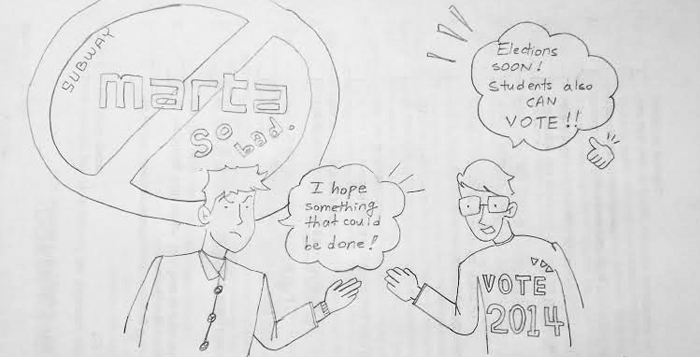
Millions of Americans will line up on Election Day to choose their political representatives and vote on ballot initiatives that could have wide-ranging impacts on their lives and communities on Nov. 4. However, every American citizen is afforded a political voice only if they choose to exercise their right to vote. Logically, this means that people who vote sit in the driver's seat while everyone else follows along in the backseat. Since 1964, voting rates among young adults nationally have fallen from 50.9 percent to 38 percent today. In order to help reverse this alarming trend, I ask that every person reading this editorial, if you are eligible, to go out and register to vote right now. If we do not vote, then how can we expect our representatives in the government to take notice of our interests?
Georgia voters will be presented with some of the most exciting statewide races in nearly a decade this November: the campaigns of Democratic candidates Michelle Nunn for Georgia's open U.S. Senate seat and Jason Carter for governor. It is not an overstatement to say that these two races are of national significance. Georgia's Senate seat is one of three possible Democratic pick-ups this cycle. The winner will help determine which party controls the U.S. Senate next year. Additionally, whoever wins the governor's race will serve as either the counterweight or enabler to Georgia's extremely conservative state legislature. The influence that these two individuals could wield is significant.
Even more importantly, however, voters will also have the power to choose whom they wish to represent them in city council deliberations and on county commission boards, as well have the opportunity to vote directly on statewide and local initiatives that could directly impact them. Although many of these local elections are won by only a handful of votes, the winners of these elections make every day decisions that have a greater and more immediate impact on our community than those of any single U.S. senator or state governor. Therefore, your vote for the county commissioner will more strongly impact your life than your vote for U.S. senator.
When I registered to vote, I became increasingly aware of issues that affect the communities surrounding Emory University. Before, I had never heard of Commissioner Jeff Rader. Now I know that Rader represents the Emory area on the DeKalb County Board of Commissioners and is up for re-election this year. For years, Rader and local residents have been fighting a legal battle against a developer wishing to develop and subdivide a parcel of historic land just south of Emory Village. It is strange to think how these events were occurring right under my nose, and I failed to notice. Being a voter made me aware of the injustices in my community.
But voting isn't just about becoming more aware. It's about action (or inaction) and consequences. In 2012, metro-Atlanta voters were presented with the opportunity to help untangle the city's congested roadways by funding several important transportation projects with an additional one percent sales tax.
Among the projects that would have been funded is a MARTA rail route with stops at Emory Point, Haygood Drive and the Clairmont campus – something that I've heard many Emory students wish for. Admittedly, even if all 14,000 Emory students voted for the sales tax, the measure still wouldn't have passed. But it would have sent a message that Emory students are civically engaged and will fight for our interests. Our representatives will notice that we are not just four-year guests, but committed community members, and take heed.
Making your voice heard through the ballot box is quite simple. First, you must register to vote. The DUC information booth has Georgia registration forms on hand. Any current Emory student that has already established residency in Georgia can vote in DeKalb County. It is unconstitutional for anyone to challenge a student's residency based on his/her student status.
If you wish, you can choose to register in your home state, which can be done by downloading registration forms online at your state's elections website. Unfortunately, you may only register in one location at a time.
Second, when Nov. 4 rolls around, don't forget to go out and vote! If you don't, someone will still be selected to represent you. Referendum decisions will still be made without your input. You will have sat on the sidelines, watching other people make decisions for you.
People complain about politicians all the time – MARTA, particularly, is a favorite punching bag amongst students. But, if you made the tiniest effort to cast a vote, then at least you tried to make something better. If not, then you really have little right to complain. The deadline to register to vote in Georgia is Oct. 6, which is now less than a month away. Know that you will still be registered for the selective service or called in for jury duty even if you do not vote.
So exercise your civic duty and pick up your form at the DUC to register today. Then when Nov. 4 rolls around, do not forget to go out and make your voice heard. Your community will thank you for it.
--By Edmund Xu
Read More
Trending






